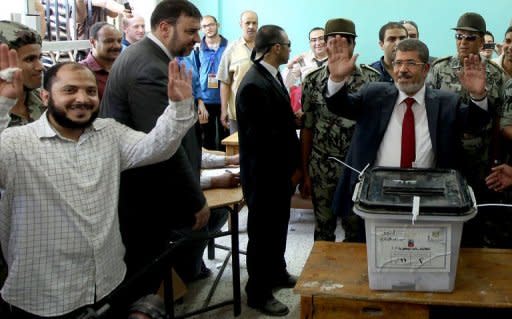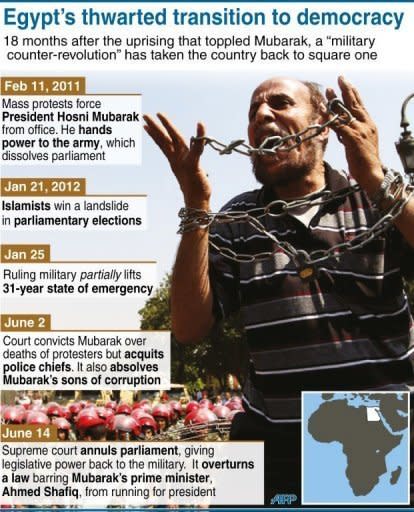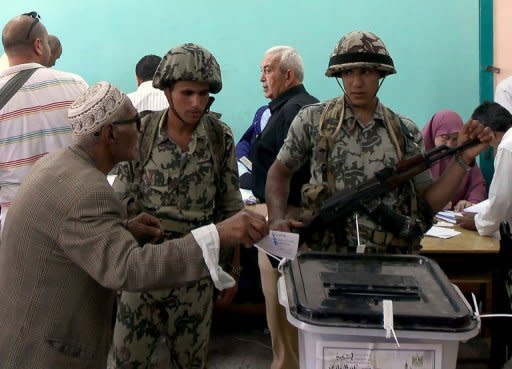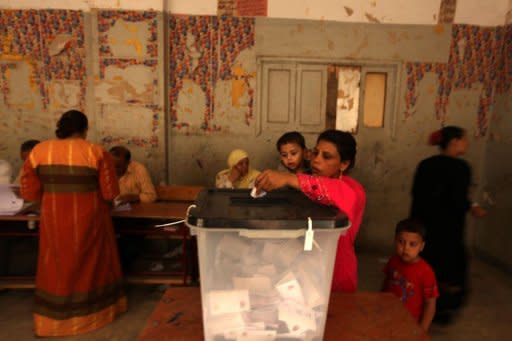Egyptians choose new president amid political chaos
Egyptians voted on Saturday in a run-off presidential election pitting an Islamist against Hosni Mubarak's last premier as the military rulers entered a showdown with the Islamists by disbanding parliament. Polling stations closed at 1900 GMT on the first of two days of voting which saw police and army troops deployed nationwide for the highly divisive election. Former air force chief Ahmed Shafiq, who served as ex-president Mubarak's prime minister in the last days of the uprising that toppled him, is vying for the top job against Muslim Brotherhood candidate Mohammed Mursi. The contest has boiled down to a choice between a conservative Islamist whose movement is criticised for trying to dominate both parliament and the presidency and an old regime holdover who promises weary voters stability. "I'm voting for Mursi because I don't want Shafiq to win. I'm scared of Mursi but I'm more scared of Shafiq," said Nagwan Gamal, 26, a teaching assistant. Samir Abdel Fattah voted for the Islamist movement in last winter's parliamentary elections, but the 50-year-old says this time he was voting for Shafiq. "I was shocked by their performance in parliament. Now I'm voting for Shafiq because he's civilised, he's a good man." "If Mursi wins, he will only serve the Brotherhood, not the country," said the factory owner, standing by his wife who wears a full face veil. The race has polarised the nation, dividing those who fear a return to the old regime under Shafiq and others who want to keep religion out of politics and fear the Brotherhood would stifle personal freedoms. The new president -- who will inherit a struggling economy, deteriorating security and the challenge of uniting a nation divided by the uprising -- will step into the role with no constitution and no parliament in place. The election comes against the backdrop of a series of steps that have consolidated the ruling military's power, infuriating activists and boosting an election boycott movement. High-profile activists and celebrities have called on Egyptians to abstain or spoil their ballots, including film star and political activist Amr Waked, who told AFP he was boycotting the vote for a variety of reasons. "I reject the military-managed process, there is no clear authority for the president, and the fact that Shafiq is allowed to run," he said. On Thursday, the Supreme Constitutional Court ruled certain articles in the law governing parliamentary elections to be invalid, thus annulling the Islamist-led house. The ruling military on Saturday notified parliament it has been dissolved and banned its members from entering the house, a move swiftly rejected by the Islamists. Parliament received a notice saying that Egypt's ruling generals had decided "to consider parliament dissolved," the official MENA news agency reported. The decision is already being implemented and lawmakers are now barred from entering parliament without prior authorisation, the agency reported. "Constant threats to dissolve parliament, elected with the will of 30 million Egyptians, confirm the military council's desire to monopolise power," the Brotherhood's political arm, the FJP, said in a statement. "Dissolving the elected parliament must go to a fair referendum," it added. The Brotherhood won 47 percent of the body's seats in a drawn-out process between November last year and February. The top court also ruled unconstitutional the "political isolation" law, which bars senior members of Mubarak's regime and top members of his now-dissolved party from running for public office for 10 years -- legislation that had threatened to disqualify Shafiq. The rulings have put legislative power back in the military's hands and have guaranteed that Shafiq, perceived to be the army's candidate, stays in the race. That, in addition to a recent justice ministry decision granting army personnel the right to arrest civilians, is proof of the army plans to anchor itself in power, activists say. They accuse the Supreme Council of the Armed Forces (SCAF), which took power when Mubarak was ousted, of staging a "counter-revolution." "This series of measures shows that the SCAF, the head of the counter-revolution, is adamant to bring back the old regime and the presidential elections are merely a show," six parties and movements said in a statement. Hesham Sallam, a researcher at Georgetown University, said the latest steps are consistent with the military's management of the transition from Mubarak's rule. "It is clear that SCAF has been pushing its vision, which is of a deep state protected and sealed from representative and elected institutions," Sallam told AFP. The official results of the presidential election are expected on June 21. "Irrespective of who wins, you don't know who will be president but you know what kind of presidency it will be. One that is subservient to SCAF. Whether that will hold is another question," Sallam said.






